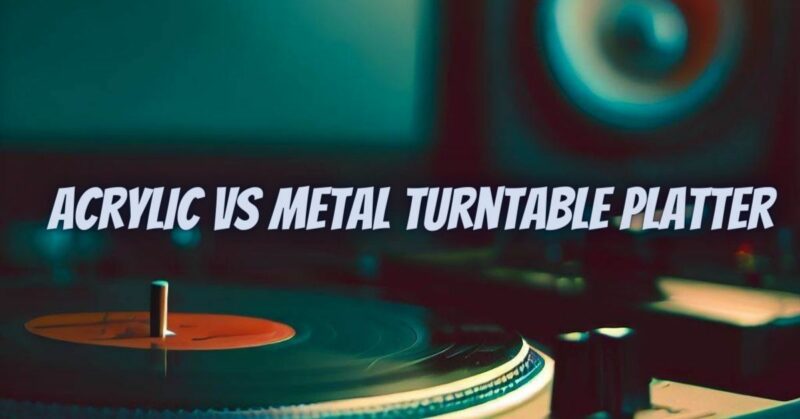The choice of turntable platter material can have a significant impact on the sound quality of your vinyl records. Acrylic and metal are two of the most popular materials used for turntable platters, each with its own advantages and disadvantages.
Acrylic platters
Acrylic platters are known for their excellent sonic properties. They are very resonant, which means that they can accurately reproduce the sound waves on the record. Acrylic platters are also very durable and can withstand a lot of wear and tear.
In addition to their sonic properties and durability, acrylic platters also have a number of other advantages, including:
- They are lightweight. Acrylic is a lightweight material, which makes it ideal for turntables. A lightweight platter is less likely to cause vibration, which can improve sound quality.
- They are non-magnetic. Acrylic is a non-magnetic material, which means that it will not attract interference from other magnetic fields. This can help to improve sound quality and reduce noise.
- They are aesthetically pleasing. Acrylic is a clear material, which gives it a sleek and modern look. Acrylic platters can enhance the appearance of any turntable.
However, acrylic platters also have some disadvantages, including:
- They can be expensive. Acrylic is a relatively expensive material, so acrylic platters can be more expensive than metal platters.
- They can be difficult to find. Acrylic platters are not as common as metal platters, so they may be more difficult to find.
- They are not as stable as metal platters. Acrylic platters are more flexible than metal platters, so they may be more susceptible to vibration.
Metal platters
Metal platters are more affordable and easier to find than acrylic platters. They are also more stable and less susceptible to vibration.
In addition to their affordability, stability, and resistance to vibration, metal platters also have a number of other advantages, including:
- They are good at dissipating heat. Metal is a good conductor of heat, which means that it can quickly dissipate heat from the turntable platter. This can help to prevent the platter from overheating, which can improve sound quality.
- They are easy to machine. Metal is a relatively easy material to machine, which makes it ideal for manufacturing turntable platters. This can help to keep the cost of metal platters down.
- They are widely available. Metal is a widely available material, so metal platters are easy to find.
However, metal platters also have some disadvantages, including:
- They do not have the same sonic properties as acrylic platters. Metal platters are not as resonant as acrylic platters, so they may not be able to reproduce the sound waves on the record as accurately.
- They can produce a more “metallic” sound. Metal is a metal, so metal platters may produce a more “metallic” sound than acrylic platters.
- They are not as aesthetically pleasing as acrylic platters. Metal is a dull metal, so metal platters may not look as good as acrylic platters.
Which type of platter is right for you?
The best type of platter for you depends on your needs and budget. If you are looking for the best possible sound quality and you are willing to pay a premium, then an acrylic platter is the best choice. If you are on a budget or you need a platter that is stable and resistant to vibration, then a metal platter is the best choice.
Here are some additional things to consider when choosing between an acrylic platter and a metal platter:
- The type of music you listen to: If you listen to music with a lot of bass or dynamic range, then an acrylic platter may be a better choice for you. This is because acrylic platters are better at tracking the grooves of a record accurately and reducing feedback from the speakers.
- Your budget: Acrylic platters are typically more expensive than metal platters. This is because acrylic is a more expensive material and requires more precise manufacturing.
- Your listening habits: If you listen to your music at high volume levels, then a metal platter may be a better choice for you. This is because metal platters are more resistant to vibration.
Ultimately, the best way to decide which type of platter is right for you is to listen to different platters and see which one sounds best to you. You may also want to consult with an audiophile expert to get their recommendations.
Additional benefits of acrylic platters
In addition to the advantages listed above, acrylic platters also offer a number of other benefits, including:
- Improved soundstage: Acrylic platters can help to improve the soundstage of a vinyl playback system. The soundstage is the perceived three-dimensional space of a recorded sound. An acrylic platter can


